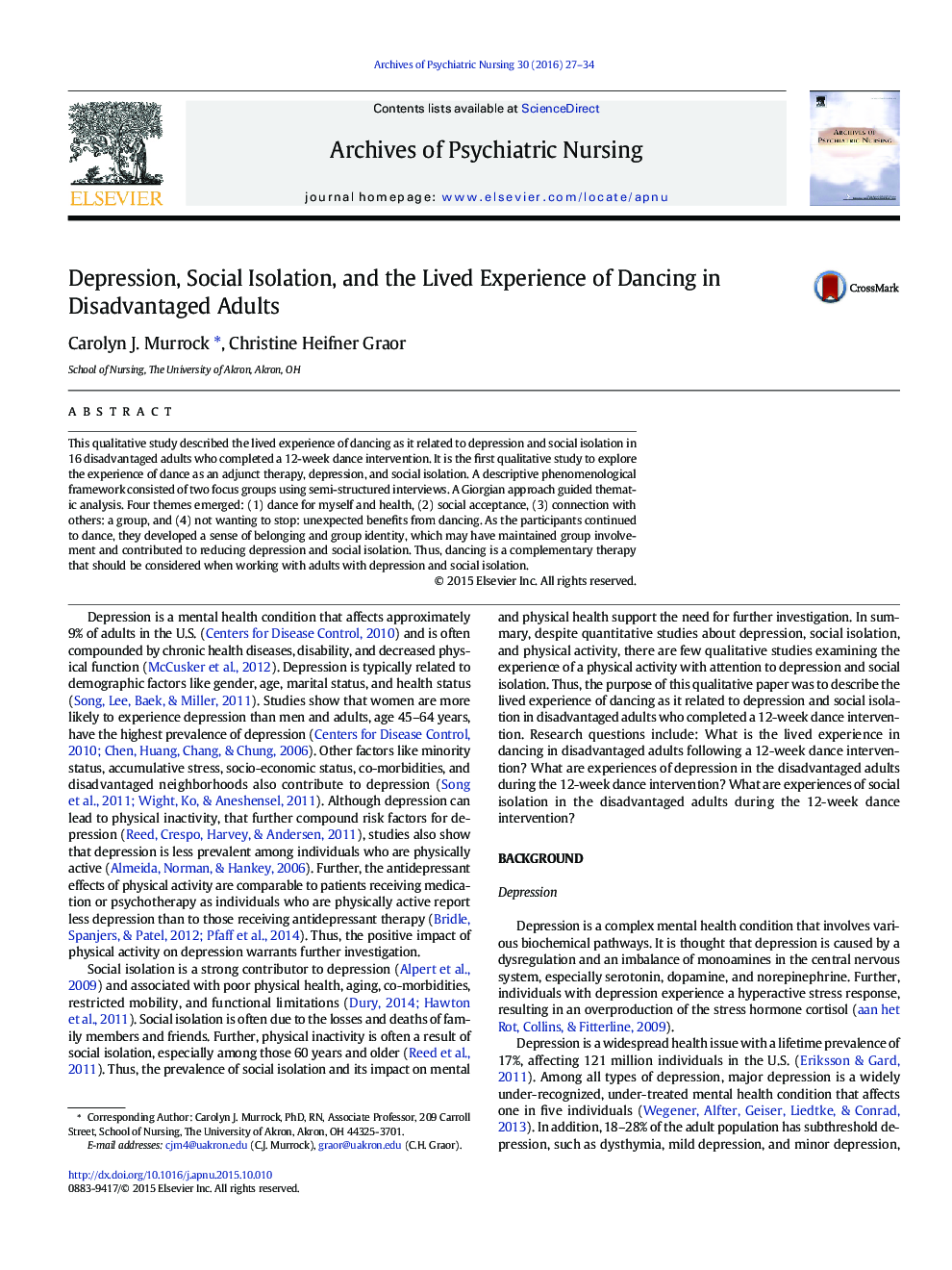| کد مقاله | کد نشریه | سال انتشار | مقاله انگلیسی | نسخه تمام متن |
|---|---|---|---|---|
| 6786945 | 1432463 | 2016 | 8 صفحه PDF | دانلود رایگان |
عنوان انگلیسی مقاله ISI
Depression, Social Isolation, and the Lived Experience of Dancing in Disadvantaged Adults
ترجمه فارسی عنوان
افسردگی، جدایی اجتماعی و تجربه زندگی رقص در بزرگسالان محروم
دانلود مقاله + سفارش ترجمه
دانلود مقاله ISI انگلیسی
رایگان برای ایرانیان
ترجمه چکیده
این مطالعه کیفی زندگی تجربه رقص را در رابطه با افسردگی و انزوای اجتماعی در 16 بزرگسالان نامناسب که مداخله رقص 12 هفته ای را انجام داد، توصیف کرد. این اولین مطالعه کیفی است تا تجربه رقص را بهعنوان درمان اضافی، افسردگی و انزوای اجتماعی بررسی کند. چارچوب پدیده شناسی توصیفی شامل دو گروه تمرکز با استفاده از مصاحبه نیمه ساختار یافته بود. رویکرد جورجیان به تجزیه و تحلیل موضوعی هدایت شد. چهار موضوع به وجود آمد: (1) رقص برای خود و سلامت، (2) پذیرش اجتماعی، (3) ارتباط با دیگران: یک گروه، و (4) عدم تمایل به توقف: منافع غیر منتظره از رقص. همانطور که شرکت کنندگان همچنان به رقص ادامه دادند، احساس هویت گروهی و گروهی ایجاد کردند که ممکن است درگیر شدن گروه ها بوده و موجب کاهش افسردگی و انزوای اجتماعی شده است. بنابراین، رقص یک درمان مکمل است که باید در هنگام کار با بزرگسالان با افسردگی و انزوای اجتماعی مورد توجه قرار گیرد.
موضوعات مرتبط
علوم پزشکی و سلامت
پزشکی و دندانپزشکی
روانپزشکی و بهداشت روانی
چکیده انگلیسی
This qualitative study described the lived experience of dancing as it related to depression and social isolation in 16 disadvantaged adults who completed a 12-week dance intervention. It is the first qualitative study to explore the experience of dance as an adjunct therapy, depression, and social isolation. A descriptive phenomenological framework consisted of two focus groups using semi-structured interviews. A Giorgian approach guided thematic analysis. Four themes emerged: (1) dance for myself and health, (2) social acceptance, (3) connection with others: a group, and (4) not wanting to stop: unexpected benefits from dancing. As the participants continued to dance, they developed a sense of belonging and group identity, which may have maintained group involvement and contributed to reducing depression and social isolation. Thus, dancing is a complementary therapy that should be considered when working with adults with depression and social isolation.
ناشر
Database: Elsevier - ScienceDirect (ساینس دایرکت)
Journal: Archives of Psychiatric Nursing - Volume 30, Issue 1, February 2016, Pages 27-34
Journal: Archives of Psychiatric Nursing - Volume 30, Issue 1, February 2016, Pages 27-34
نویسندگان
Carolyn J. Murrock, Christine Heifner Graor,
